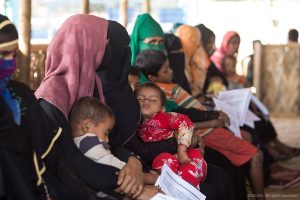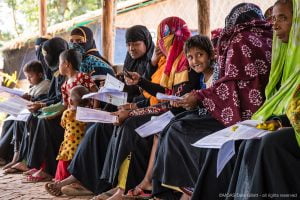Dear Nasrin,
I am writing this letter to you, in the hope that sooner or later you will read it.
I wish that not only my voice could reach you, but also the voices of all the women who support freedom of thought, of speech, of opinion, who claim as their own your courageous fights as a woman, as a mother, as a lawyer and as an activist.
On the 11th of March you were sentenced to 33 years in prison and 148 lashes by a judge in Tehran, after being held in the much-feared Evin prison since the 13th of June 2018, and tried in absentia in the Iranian capital on December 30th .
This sentence is the consequence of your positions and activities in support of human rights, especially your defence of women who protest against the obligation to wear the veil and your public opposition to the death penalty. The accusations brought against you by the Iranian court range from “incitement to corruption and prostitution” to “open commitment to sinful acts”, from “appearing in public without a hijab” to “disrupting public order” and “disturbing public opinion”, from “conspiracy against the system” to “creating a group with the aim of threatening national security”, from “spreading propaganda against the system” to “collusion to commit crimes against national security”.
An arrest, dear Nasrin, rooted in the protests that took place in your country during 2018 against the obligation to wear a hijab.
Last year, women out on the streets removed their veils, fixed them to sticks and started waving them around, a gesture that caused attacks, arrests, ill-treatment and torture as a reaction from the police and the authorities. At the end of the trials which followed, many women were sentenced.
Women like you, Nasrin – you, who have suffered this treatment for being part of the movement of human rights defenders, for your involvement in the Step by Step campaign for the abolition of the death penalty, for providing legal support to several women, for your efforts to report the torture suffered by Shaparak Shajarizadeh, who was sentenced to 20 years in prison for peacefully protesting against the obligation to wear a veil. Even your determination to choose an independent lawyer, not on the list of the 20 selected by the head of the judiciary for your defence, has been considered an additional criminal act.
The European Parliament, where I was recently invited for a meeting dedicated to NGOs, awarded you the Sakharov Prize for Freedom of Thought in 2012. You have been accused by the Iranian judiciary of using the prize money to support your activities against national security, with the aim of overthrowing the state. Over the years, you have been arrested several times just because you wanted to defend your freedom of speech. Together with you, friends and family – like your husband Reza Khandan, or your friend and fellow activist Farhad Meysami – have been subjected to detentions and sentences.
The action implemented by the Iranian judiciary intends to silence your voice, one of the strongest free and democratic voices of dissent against the regime. This should be an opportunity for critical reflection in my country, Italy, and throughout Europe and the West.
For this reason I join you: because it is important to give voice to this story that, like so many others, is a story of courageous women fighting for their rights, yet occupying a marginal role in the international press and media.
The women I have met in recent years – Syrians, Nigerians, Eritreans, Afghans, Libyans, Iranians, Rohingya, Bengalis, women from all over the world – cannot, must not all flee their countries. Today, those who courageously remain to fight are silenced, sometimes abused, deprived of their fundamental freedoms. We want to gather closely around these courageous women.
Dear Nasrin, I hug you with all my heart and I hope you can feel our support.
Never give up,
Regina Catrambone



